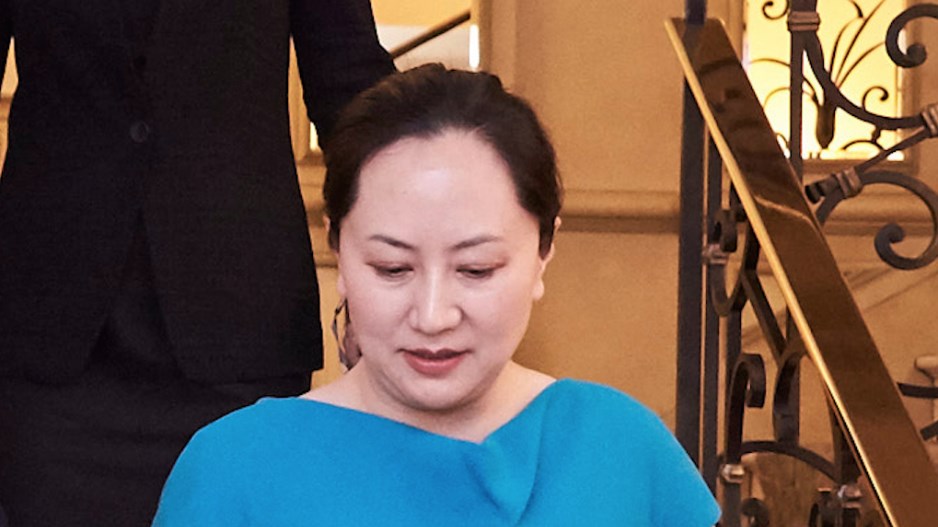Meng Wanzhou's defence cross-examination of RCMP Const. Winston Yep - the officer who arrested the Huawei Technologies Co. Ltd. CFO at YVR on Dec. 1, 2018 - continued today at a Vancouver courthouse, as the Chinese exec's attorneys dug deep into procedural shortfalls in the arrest process.
Under heavy questioning Tuesday afternoon, Yep admitted that he did not check and verify the background information contained in an affidavit provided to him by the Department of Justice regarding the Meng case, including the included note that Meng had no ties to Canada - despite the fact that the exec owned two houses in Vancouver.
Yep then signed the affidavit as part of the process to secure the arrest warrant for Meng, he said.
"The affidavit was prepared not by myself," Yep said in court. "I reviewed it, and yes, there was an error on my part that [the affidavit said] she didn't have ties to Canada. I didn't write that in there, but from the view of the [extradition] request, that was not actually in there, so it should not have been in the affidavit."
Yep also said that - when he did find out from the border agents that Meng owned homes in Vancouver - it did not cross his mind to update the affidavit or to inform anyone of the discrepancy. However, the police officer maintained that the arrest warrant's requirement of "immediate arrest" was met in that Yep arrested Meng the moment she completed secondary inspection from the Canada Border Services Agency - the exact moment the Huawei executive was finished with border agents' jurisdiction.
"My interpretation of 'immediate' was 'as soon as practicable,'" Yep said.
The hearings will resume Wednesday morning.
The witness testimony portion of the extradition hearing began on Monday with Yep taking questions from both Crown attorney John Gibb-Carsley and defence lawyer Richard Peck. This morning, Peck focused his efforts on Yep and another police officer going to Vancouver International Airport the evening prior to the arrest - on Nov. 30, 2018 - to meet with border services officials.
Yep said he decided to make to trip to check personally whether Meng was on the flight bound for Vancouver, but Peck pointed to a number of email correspondences and notes left for Yep by other officials that the information was available via a telephone call or other forms of telecommunication.
"You could have phoned to get a number of people to get that information, in this case, correct?" Peck asked Yep, to which the police officer confirmed. "I accept that you made a decision [to physically go to the airport], but these contacts were available to you."
Peck also brought up a number of e-mails between Canadian border officials and the RCMP that appear to indicate coordination, with one specific message mentioned that police officers will go to YVR to ensure the operation was coordinated."
Yep maintained that it was not the purpose of the visit to coordinate any sort of arrest plan. He added that - again - the airport jurisdiction belong to the border agents, and the RCMP officer holding the arrest warrant (Yep) deferred to border agents on the serving of the warrant.
During his questioning by Crown counsel on Monday, Yep emphasized Meng's arrest as routine, with a casual suggestion of making the arrest on the plane immediately after Meng's arrival at the gate dismissed for public safety concerns for other passengers.
Yep also noted that - in the other two extradition arrest cases where he served the warrant - the CBSA had first jurisdiction in assessing the person's admissibility into the country. In one case, the suspect was already in Canada; in the other, the suspect was being held by the CBSA after the border check turned up something that required detention.
Peck had focused his cross-examination Monday on the cancellation of the plan to arrest Meng on the plane, questioning what the public safety concern was to arrest Meng - who is facing financial crimes and does not have a history of violence - on the plane to fill the "immediate arrest" requirement of the warrant.
Yep noted that even with FBI information indicating that Meng was only travelling with a female companion and did not have other bodyguards, the police cannot take any chances or make assumptions about the potential of harm to other passengers if an arrest attempt triggers a violent response. He added that while Gibb-Carsley suggested the officer keep a timeline of the arrest procedures, the police officer took that to only be a guideline of operations, not a necessity - thus resulting in Yep not recording a timeline in his notes.
Meng was held for three hours by CBSA agents upon her arrival in Vancouver, where her electronic devices were collected. She was then arrested by police and informed of her rights, a sequence of events that - her lawyer said - indicated a conspiracy to coordinate the securing of evidence for an eventual criminal trial in the United States.




